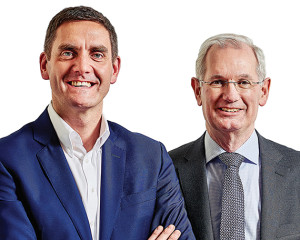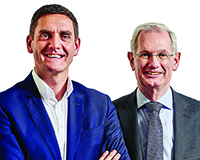
It is a back-from-the-brink story with all the elements of northern grit, old-school alliances and celebrity endorsement that should form the foundations of a ripping property yarn.
Manchester-based Ask Developments nearly went bust following the financial crisis of 2008. This year its reborn company, Ask Real Estate, won the backing of construction giant Carillion and is competing with Argent and Urban & Civic for one of the biggest development opportunities in the city, the £750m Mayfield scheme.
So how did it manage to attract the much-needed investment of its current majority shareholder Carillion? And what steps were taken to evolve Ask into the thriving and profitable business it is today?
Perfect storm
Of course, the story starts far less positively, in tougher times.
The company was founded as Ask Developments in 2000 by Select Property’s Ken Knott, Simply Red vocalist Mick Hucknall, Andy Dodd and Simon Bate. Over its first eight years the developer built up a portfolio of 20 projects comprising 8m sq ft, borrowing heavily from the Co-Operative Bank.
Then it made an untimely partnership with the Morgan Stanley Real Estate Fund, which took a 25% holding in the business in 2006. When the financial crisis of 2008 threatened to push the industry off a cliff, the company was dangerously exposed, given its highly leveraged status.
Managing director John Hughes joined the group in 2003 and has navigated it through the whole of the last economic cycle.
“I remember one of the comments from the MSRF guys in 2008,” he recalls. “They’d just come back from a New York conference and said, ‘There’s a perfect storm brewing and if you are still afloat at the end of it then you’ll be fine, but it’s going to be tough.
“I’d just got on to the board and been made a director of shareholders and I thought, what? This doesn’t sound right. And then sure enough, the wheels completely came off.”
He recalls how the company, then led by chief executive Ken Knott, set off on a journey which was a “hallmark of the times” – highly-leveraged with thinly-spread equity – in expectation of the train just keeping on going.
But of course, it didn’t.
In 2010, Ask Developments’ results showed debts of £58.5m, rising to £73.4m in 2013 and falling to £62.5m in 2014, as the company sold off its assets to repay its loans.
Fighting back
Ask formed a new company in 2012, Ask Real Estate, which Hughes says was a bid to “start afresh and deliver”. Ask Developments was gradually wound down, repaying all its debt.
Knott left the company in 2013 to join Select Property as chief development officer, leaving Hughes to take over the reins. Since then, Hughes has turned the company’s finances around, with Ask Real Estate reporting a £1.1m profit in the year ending 31 March 2015.
“It would have been easy to do what other organisations have done and will do, which is to just throw the keys in and say, ‘thanks’,” he says.
But instead, the company worked with its long-term lenders at the Manchester-based Co-op to deliver all of the assets they held debt against, asset manage them, lease them and sell them.
“The Co-op had been with us for many years,” Hughes says. “They’re a Manchester-based lender and had backed us on some groundbreaking projects which other banks wouldn’t. We delivered those and it worked well, so we worked with the senior people there and we delivered.”
Sales included Eden Square shopping centre in Urmston, comprising 68,200 sq ft of shops, that was sold to Threadneedle Pensions for £13.3m in 2014.
Threadneedle also bought Leopold Square in Sheffield for £10m in February 2015. The 90,000 sq ft mixed-use scheme comprises a 90-bedroom, four-star boutique hotel, 42 flats, bars and restaurants.
Ask’s damage-repair mission concluded last year, with the sale of its landmark £500m First Street regeneration project in Manchester to German investor Patrizia Immobilien.

Emotional ties
Hughes’ next move was to persuade the company’s original founding members to sell their shares, allowing Carillion to become a majority shareholder in a deal that completed in January.
“The other shareholders were remote,” Hughes says. Bates had moved to Baltimore in the US, Dodd was living in Bath, Hucknall in the south of England and Knott was busy running Select Property.
“For me the rationale was clear,” says Hughes. “There was a huge opportunity with our delivery team, but we needed that financial platform.”
He says the buyout was consensual and that everyone was happy. “The business had achieved a huge amount over that 15-year period, and it’s now about what we are going to do in the next 10- to 15-year period,” he says.
Carillion had been working with Ask since 2000, building out 3m sq ft for the business. Most recently they have collaborated in a joint venture with Tristan Capital Partners on the two-phase delivery of Embankment in Manchester’s city centre.
Simon Eastwood, Carillion’s managing director, says: “The opportunity came up to buy into the organisation and because we already knew them so well, we thought, this is a fantastic delivery team that can catapult our presence in Manchester. We have a lot of complementary strengths.”
New chapter
Hughes has seen the Manchester property market transform during his career, and he now believes it is difficult to compete without the kind of scale and resources that the company has gained with the backing of Carillion – a company with a turnover of £4.6bn and staff totalling 50,000 people.
“Organisations such as Network Rail or Manchester City Council or Salford Council, need to know the organisation they’re entering into a contract with is going to be there. Not just to deliver it, but to manage it and then do the next phases, and deliver that vision.”
To illustrate his point, the company has just secured its first development project under the new partnership – the regeneration of the 1.7-acre former Bauer Millet car dealership in Deansgate – where residential values are consistently among the highest in the city.
“That opportunity – the speed of transaction – is exactly the sort that we would not have been able to do six, nine, 12 months ago, pre Carillion’s investment,” Hughes says. “So that’s exciting.”
Eastwood is optimistic he will see a strong return on his investment, citing Manchester’s incomparable civic leadership and track record of attracting international investment as indices of its strong future.
“Manchester is probably the only place outside London that international investors now look at regularly,” he says.
Following a 100% successful track record for winning procurement processes over the past year, the partnership’s attention is now focused on winning the £750m Mayfield regeneration opportunity next to Manchester’s Piccadilly Station.
“Property goes around in cycles, and it will all come to an end one day,” Eastwood says. “But in the immediate future, Manchester is pretty strong.”
Future projects
Former Bauer Millet showroom, Deansgate
GDV: £300m
750,000 sq ft
150-bedroom four-star hotel, 350,000 sq ft offices, 400 flats, 30,000 sq ft leisure
Embankment West (joint venture with Select Property Group)
GDV: Undisclosed
694-unit PRS scheme split between 12, 25 and 32 storey levels. Private dining room, co-working spaces, gym, media room, yoga studio
Gateshead Quays (joint venture with Patrizia)
GDV: £200m
800,000 sq ft
Mixed-use scheme. Specific details not yet disclosed

Macclesfield town centre
GDV: £15m
60,000 sq ft
Multiplex cinema, restaurants and retail space designed around an area of public realm
100 Embankment, Manchester city centre
GDV: £65m
165,000 sq ft of grade A offices
To send feedback, email louisa.clarence-smith@estatesgazette.com or tweet @LouisaClarence or @estatesgazette











